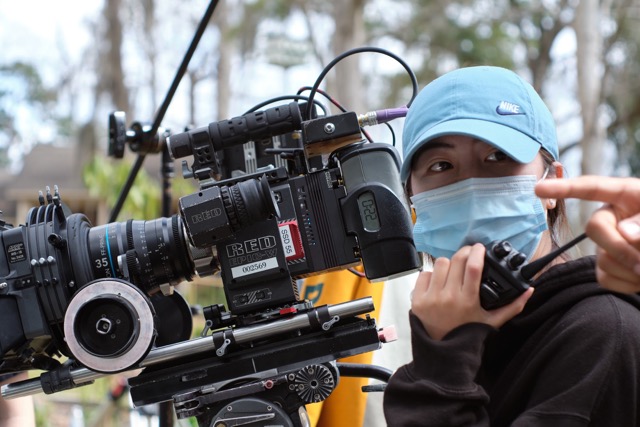Writer/director Di Lu’s Recipient is poetry. Make no mistake, this is a dramatic film but is also most certainly cinematic poetry. Crushing loss, misunderstood intentions, and vague hints about what has happened in the lives of three people are the intertwined plot points that leave the audience questioning how to make sense of life when things go wrong. The columns upon which this tale stands are the visual concepts of cinematographer Ruoyu Zhang. This Shanghai born DP establishes a visual language which magnifies and resonates the pain that overtakes Wu Yan and Qiu Jia (the film’s two central characters) in a way that causes it took project off the screen and into the very hearts of an audience. Though the story is built upon the immigrant experience in the U.S., Ruoyu has managed to create a visual journey that makes it all seem familiar, transcending anything so culturally based that it excludes relatability. This is surely the work of the most gifted of filmmakers, to allow anyone to deeply comprehend and recognize the path of someone who may be entirely different from themselves and imagine their own reactions.
Wu Yan (played by Haosong Yang of the fifty-two-million-dollar grossing Chinese film Hollywood Adventures) is newly arrived in America where he has come to surprise his wife, ending their two-year separation which is unexplained except for a brief mention that he was “released.” He enters the hair salon where his wife works and asks for her, only to be shocked with the news that she died quite some time ago. Arriving at her apartment, Wu Yan discovers that the woman living there, Qiu Jia (Tracy Ju), is actually the person who has been corresponding with him as his wife since her passing. The events that follow cause these two people to reconsider who they are and what the future will bring each of them.

DP Ruoyu immediately sets the unusual tone for this film in her lighting design which takes advantage of the Florida setting. She communicates, “I think it’s a heartbreaking story that happens in bright sunlight. Lighting-wise, I wanted to make a high-contrast look. I used a Black Pro mist 1/2 filter to diffuse the light a little bit so that I could create a mood that has bright light but still has a soft quality to fit the story and also enhance the heartbreaking feeling. I think I succeeded in setting the tone and building the visual world.” There is a subtlety to Chinese films that is found in Recipient but also a willingness to extend the emotion in a slightly more overt manner, clarifying that Ruoyu and director Di Lu are combining influences of their home country’s film style and that of Hollywood. One benevolent result of the Covid lockdown is that it has stoked the intrigue of international audiences to explore films of other countries; equally, it has brought to light filmmakers like these who are creating their own style. The evolution of every artform is a certainty if it is to continue; in Recipient, Ruoyu is giving voice to this idea with her deeply moving visual language. Her commitment to film’s ability to achieve understanding is communicated as she declares, “Cinematography is a universal language that allows me to reach my audience across different languages, nationalities, and cultural backgrounds. One production I did as a cinematographer featured an all-Chinese-speaking cast. Our film was first screened in a movie theater in Florida where most of the audience didn’t speak Mandarin. However, our project was met with cheers and ovations at the end and was later selected for screening at several domestic film festivals. At that moment, I felt I was able to tell a story and convey powerful messages through just my camera movements, shot designs, and lighting setups, none of which are tethered by cultural or language differences.”

Thomas Jackson is a dynamic and talented content writer at WonderWorldSpace.com, renowned for his engaging and informative articles. Beyond his professional pursuits in writing, Jack is also known for his deep passion for fitness, which not only shapes his lifestyle but also influences his work.


